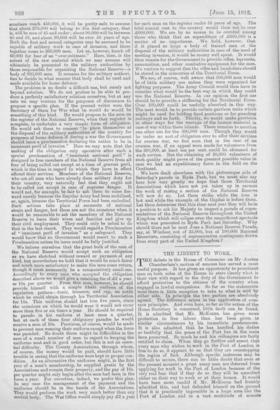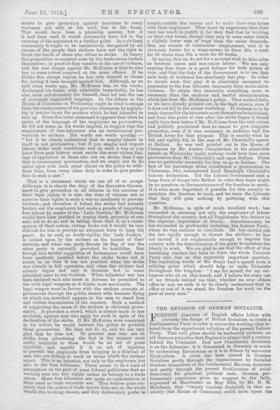THE LIBERTY TO WORK. T HE debate in the House of
Commons on Mr Austen Chamberlain's motion of censure has served a most useful purpose. It has given an opportunity to prominent men on both sides of the House to state clearly what is their view with regard to the duty of the Government to afford protection to the citizens of the country when engaged in lawful occupations. So far as the statements went there is little exception to take to what is said by either side. In principle the two parties are absolutely agreed. The difference arises in the application of com- mon principles. And oven here, so far as the action of the Home Secretary is concerned, little fault can be found. It is admitted that Mr. McKenna, has given more protection to free labour than has been given in similar circumstances by his immediate predecessors. It is also admitted that he has handled his duties so tactfully that the peace of the Port has in the main been preserved. So much he and his colleagues are fairly entitled to claim. When they go further and assort that every man who wishes to work in the Port of London is free to do so, it appears to us that they are overstepping the region of fact. Although specific instances may be difficult to secure, there can be little doubt that even at the present moment a groat many men are deterred from applying for work in the Port of London because of the very real fear that if they do so they will be assaulted either on their way to work or at their homes. It would have been more candid if Mr. McKenna had frankly admitted this, and had defended himself on the ground that it is practically impossible in a huge area like the Port of London and in a vast multitude of minute streets to give protection against terrorism to every workman not only at his work but in his home. That would have been a plausible answer, but if it had been used it would necessarily have led to the carrying of the argument to a further point. In a civilized community it ought to be instinctively recognized by all classes of the people that strikers have not the right to break the heads of those who refuse to strike. In theory this proposition is accepted even by the trade-union leaders themselves ; in practice they connive at the use of violence, and the real charge against Mr. McKenna is that he also has to some extent connived at the same offence. If he thinks this charge unjust, he has only himself to blame for having it been brought against him. Although, as we said some weeks ago, Mr. McKenna has, on. the whole, discharged his duties with admirable impartiality, he has also, most unfortunately for himself, been led into the use of extremely unguarded language. In the debate in the House of Commons on Wednesday night he tried to escape from the consequences of his previous utterances by explain- ing in precise terms the position which he had intended to take up. From this latter statement it appears that when he spoke of the language of the employers as provocative, he did not mean, as his words implied, to suggest that the employment of free-labourers was an unwarranted pro- vocation to strikers. His words are worth quoting :— " Let it be clearly understood that to employ labour in itself is not provocative ; but if you employ and import labour under such conditions and in such a way as you know from past history must excite the most violent feel- ings of opposition in those who are on strike, then I say that is unnecessary provocation, and we ought not to be called upon with such. great claims on the police to with- draw them from every other duty in order to give protec- tion in such a case."
That is a statement which we can all of us accept. Although it is clearly the duty of the Executive Govern- ment to give protection to all citizens in the exercise of their legal rights, it is also the duty of citizens not to exercise their rights in such a way as needlessly to provoke violence ; and therefore if before the strike had actually broken out the employers had made a parade of importing free labour by means of the Lady Jocelyn,' Mr. McKenna would have been justified in urging them, privately at any rate, not to do so, and in telling them that if, as a conse- quence of their action, rioting broke out it would be very difficult for him to provide an adequate force to keep the peace. As be said, no doubt rightly, the Lady Jocelyn' is looked upon by the strikers as the banner of their enemies, and when one party flaunts its flag of war the other party is naturally provoked to hostilities. But though this tactful suggestion of forbearance would have been perfectly justified before the strike broke out it seems to us that it was not justified when the strike was already in full operation, and when the strikers had already begun not only to threaten but in some admitted cases to use violence. When industrial war has been declared each side must in fairness be permitted to use such legal weapons as it thinks most serviceable. The legal weapon most in favour with the strikers consists of processions through the public streets with banners flying on which are inscribed appeals to the men to stand firm and violent denunciation of the masters. Such a method of supporting the cause of the strikers is obviously provo- cative. It provokes a crowd, which is always more or less excitable, against men who apply for work in spite of the declaration of the strike. If Mr. McKenna were consistent in his action, he would instruct the police to prohibit these processions. He does not do so, and we are very glad that he does not. To prevent men who are on strike from advertising the fact in the manner most easily available to them would be an act of great injustice, and equally it is an act of injustice to prevent the employers from bringing in a shipload of men who are willing to work on terms which the strikers reject. This is an injustice, not only to the employers, but also to the free labourers. There seems to be a kind of assumption on the part of some Liberal politicians that no working man has any rights unless he belongs to a trade union. Many free labourers are quite as conscientious in their creed as trade unionists are. They believe quite sin- cerely that the action of trade unions does not on the whole benefit the working classes, and they deliberately prefer to remain outside the unions and to make their own terms with their employers. They know by experience that their view has much to justify it, for they find that by working on their own terms, though they may in some cases obtain a slightly lower rate of wage than the union demands, they are certain of continuous employment, and it is obviously better for a wage-earner to draw 28s. a week for 52 weeks than 30s. a week for 40 weeks.
In saying this we do not for a moment wish to take sides as between union and non-union labour. We are only arguing that there is a good defence for both points of view, and that the duty of the Government is to see that each body of workmen has absolutely fair play. In order to secure such fair play it is absolutely necessary to guarantee to the free labourer immunity from trade-union violence. To attain this immunity something more is necessary than the cautious and tactful administration which has been Mr. McKenna's policy. That method fails, as we have already pointed out, in the back streets, even if it does not fail in the actual workshop. If violence is to be made impossible the terrorists must themselves be terrorized, and from this point of view after the strike began it would really have been bettor if Mr. McKenna from the very outset had publicly proclaimed that he meant to give complete protection, even if it was necessary to mobilize half the British Army for that purpose. This is exactly what he did, and rightly did, in the case of Mr. Churchill's speech at Belfast. As was well pointed out in the House of Commons by Mr. Austen Chamberlain in his admirable speech on Wednesday night, nothing could have been more provocative than Mr. Churchill's raid upon Belfast. There was no particular necessity for him to go to Belfast. The fact of his parentage alone constituted a provocation to Ulstermen, who remembered Lord Randolph Churchill's famous declaration. Yet the Liberal Government sent a large force of troops into Belfast in order that there might be no question on the maintenance of the freedom to speak. It is even more important if possible for this country to maintain the freedom to work, and we warn the Liberals that they will gain nothing by paltering with this question.
Mr. McKenna, in spite of much excellent work, has succeeded in alarming not only the employers of labour throughout the country, but all Englishmen who believe in the supremo importance of liberty. Simultaneously ho has succeeded in profoundly irritating the Labour Party, whom be was anxious to conciliate. He has carried out the law rigidly enough to thwart the strikers ; he has not carried it out emphatically enough to impress the country with the determination of his party to maintain the liberty to work. We are glad to see that the effect of this hesitating conduct has been to force the whole Unionist Party into line on this supremely important question. The concluding words of Mr. Boner Law's speech form a rallying point which should help to unite Unionists throughout the kingdom : " I say for myself, for my col- leagues who sit on this bench, and I believe for every one of my friends behind me that, whether we ever obtain office or not, we wish it to be clearly understood that in office or out of it we stand for freedom for work on the part of every man."











































 Previous page
Previous page